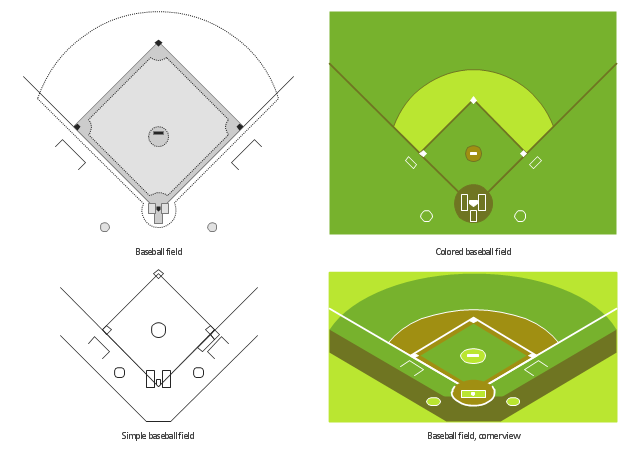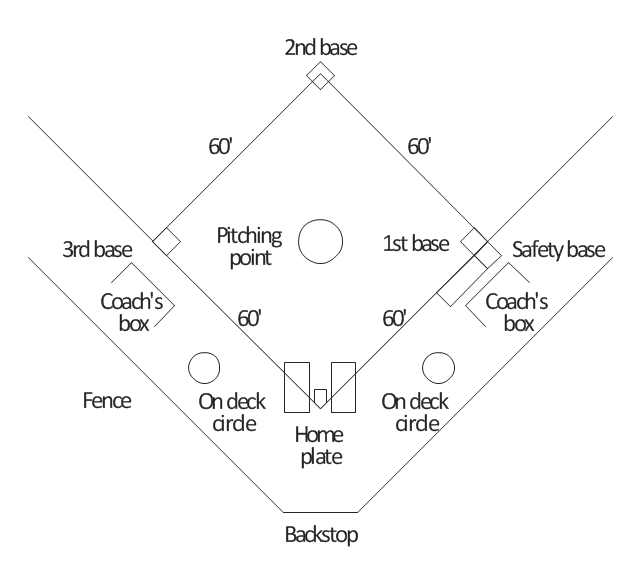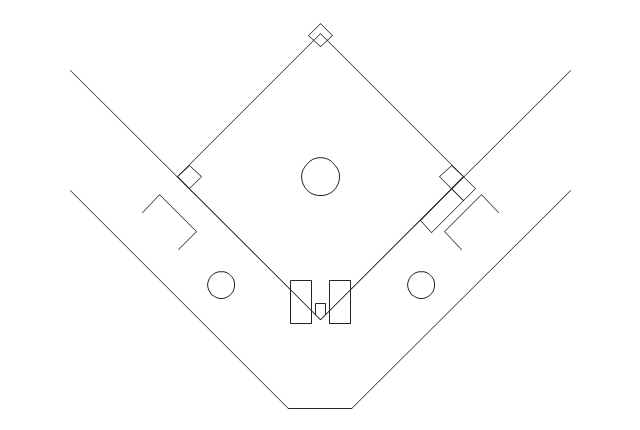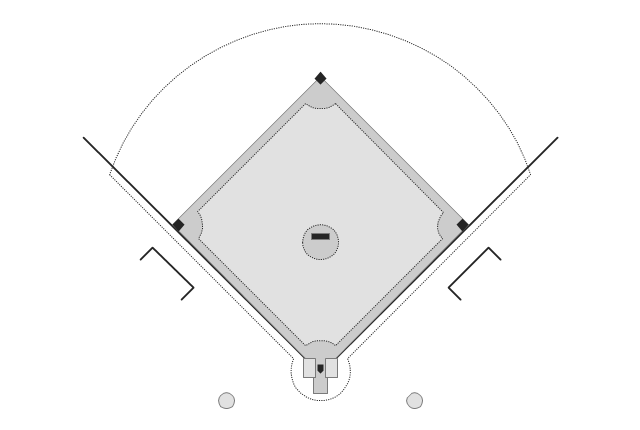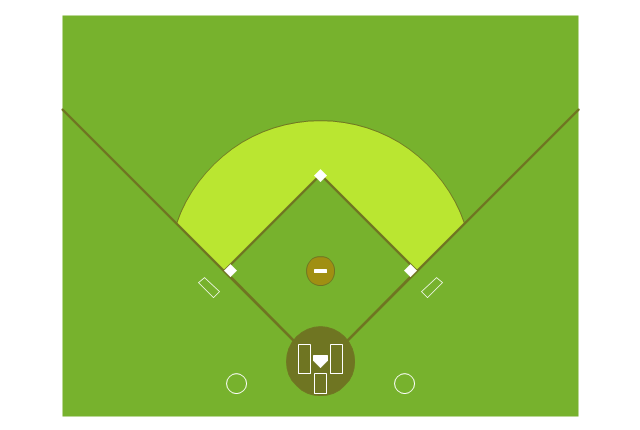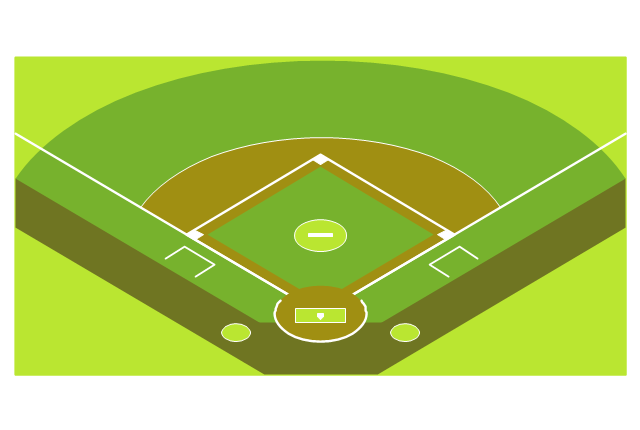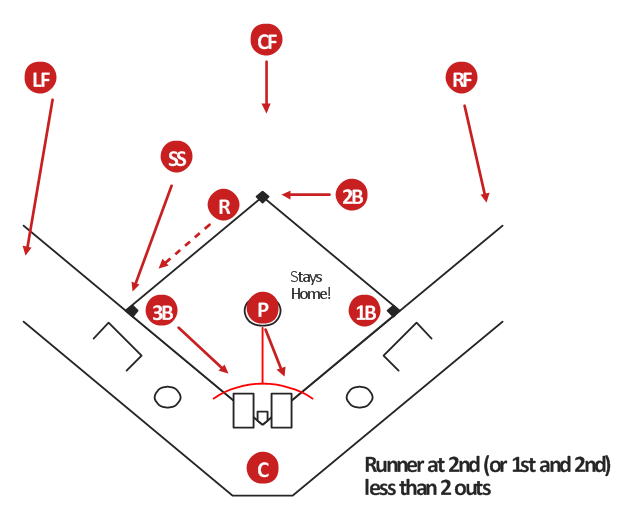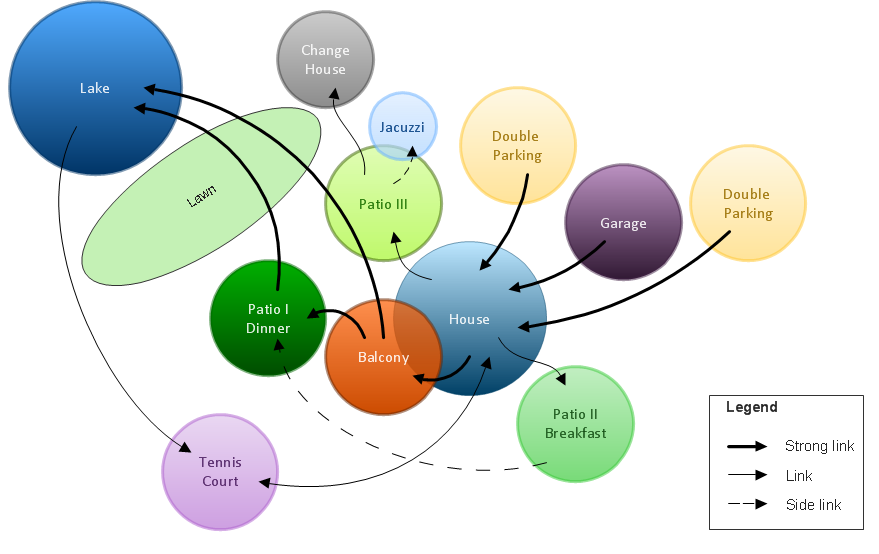The vector stencils library "Baseball fields" contains 4 shapes of baseball fields.
"A baseball park, also known as a ball park, ballpark, or baseball field, is a venue where baseball is played. It consists of the playing field and the surrounding spectator seating. While the diamond and the areas denoted by white painted lines adhere to strict rules, guidelines for the rest of the field are flexible.
The term "ballpark" sometimes refers either to the entire structure, or sometimes to just the playing field. A home run where the player makes it around the bases, and back to home plate, without the ball leaving the playing field is typically called an "inside-the-park" home run. Sometimes a home run over the fence is called "out of the ballpark," but that phrase more often means a home run that clears the stands and lands outside the building. The playing field is most often called the "ballfield," though the term is often used interchangeable with "ballpark" when referring to a small local or little-league facility." [Baseball park. Wikipedia]
The example "Design elements - Baseball fields" was created using the ConceptDraw PRO diagramming and vector drawing software extended with the Baseball solution from the Sport area of ConceptDraw Solution Park.
"A baseball park, also known as a ball park, ballpark, or baseball field, is a venue where baseball is played. It consists of the playing field and the surrounding spectator seating. While the diamond and the areas denoted by white painted lines adhere to strict rules, guidelines for the rest of the field are flexible.
The term "ballpark" sometimes refers either to the entire structure, or sometimes to just the playing field. A home run where the player makes it around the bases, and back to home plate, without the ball leaving the playing field is typically called an "inside-the-park" home run. Sometimes a home run over the fence is called "out of the ballpark," but that phrase more often means a home run that clears the stands and lands outside the building. The playing field is most often called the "ballfield," though the term is often used interchangeable with "ballpark" when referring to a small local or little-league facility." [Baseball park. Wikipedia]
The example "Design elements - Baseball fields" was created using the ConceptDraw PRO diagramming and vector drawing software extended with the Baseball solution from the Sport area of ConceptDraw Solution Park.
"A baseball field, also called a ball field or a baseball diamond, is the field upon which the game of baseball is played. The term is also used as a metonym for baseball park. ...
The starting point for much of the action on the field is home plate, which is a five-sided slab of whitened rubber, 17-inches square with two of the corners removed so that one edge is 17 inches long, two adjacent sides are 8½ inches and the remaining two sides are 12 inches and set at an angle to make a point. Adjacent to each of the two parallel 8½-inch sides is a batter's box. The point of home plate where the two 12-inch sides meet at right angles, is at one corner of a ninety-foot square. The other three corners of the square, in counterclockwise order from home plate, are called first base, second base, and third base. Three canvas bags fifteen inches (38 cm) square mark the three bases. These three bags along with home plate form the four bases at the corners of the infield." [Baseball field. Wikipedia]
The diagram example "Simple baseball field" was created using the ConceptDraw PRO diagramming and vector drawing software extended with the Baseball solution from the Sport area of ConceptDraw Solution Park.
The starting point for much of the action on the field is home plate, which is a five-sided slab of whitened rubber, 17-inches square with two of the corners removed so that one edge is 17 inches long, two adjacent sides are 8½ inches and the remaining two sides are 12 inches and set at an angle to make a point. Adjacent to each of the two parallel 8½-inch sides is a batter's box. The point of home plate where the two 12-inch sides meet at right angles, is at one corner of a ninety-foot square. The other three corners of the square, in counterclockwise order from home plate, are called first base, second base, and third base. Three canvas bags fifteen inches (38 cm) square mark the three bases. These three bags along with home plate form the four bases at the corners of the infield." [Baseball field. Wikipedia]
The diagram example "Simple baseball field" was created using the ConceptDraw PRO diagramming and vector drawing software extended with the Baseball solution from the Sport area of ConceptDraw Solution Park.
 Baseball
Baseball
The Baseball Solution extends ConceptDraw DIAGRAM.5 (or later) software with samples, templates, and libraries of vector objects for drawing baseball diagrams, plays, and illustrations. It can be used to make professional looking documents, presentations,
The vector stencils library "Baseball fields" contains 4 templates of baseball fields.
Use it to create baseball positions diagrams in the ConceptDraw PRO diagramming and vector drawing software extended with the Baseball solution from the Sport area of ConceptDraw Solution Park.
Use it to create baseball positions diagrams in the ConceptDraw PRO diagramming and vector drawing software extended with the Baseball solution from the Sport area of ConceptDraw Solution Park.
 Sport Field Plans
Sport Field Plans
Sport Field Plans solution extends ConceptDraw DIAGRAM with samples, templates and libraries of ready-made design elements for developing layouts of sport fields, recreation areas, playground layouts plans, and for professional drawing various sport field plans — for football, basketball, volleyball, golf, baseball, tennis, etc. Depict all your playground layout ideas easily and decisively implement the playground layout designs. Use the final colorful, strict and accurate ConceptDraw's playground layouts when designing the building documentation, brochures, booklets, advertising materials, sports editions, sport maps, business plans, on web sites of sport complexes, sport centers, hotels, etc.
"Basic Bunt Coverage ...
The next few posts will be related to bunt coverages. I will include a diagram, a description of the situation, and a position by position description of field responsibilities. Some of these coverages will be very standard." [coach5150.wordpress.com/ 2009/ 12/ 28/ basic-bunt-coverage-1/ ]
"Basic Bunt Coverage #2: Runner at 2nd.
Situation: Runner at 2nd base or runners at both 1st and 2nd. Less than 2 outs." [coach5150.wordpress.com/ 2010/ 01/ 01/ basic-bunt-coverage-2-runner-at-2nd/ ]
The baseball positions diagram example "Basic bunt coverage - Runner at 2nd" was created using the ConceptDraw PRO diagramming and vector drawing software extended with the Baseball solution from the Sport area of ConceptDraw Solution Park.
The next few posts will be related to bunt coverages. I will include a diagram, a description of the situation, and a position by position description of field responsibilities. Some of these coverages will be very standard." [coach5150.wordpress.com/ 2009/ 12/ 28/ basic-bunt-coverage-1/ ]
"Basic Bunt Coverage #2: Runner at 2nd.
Situation: Runner at 2nd base or runners at both 1st and 2nd. Less than 2 outs." [coach5150.wordpress.com/ 2010/ 01/ 01/ basic-bunt-coverage-2-runner-at-2nd/ ]
The baseball positions diagram example "Basic bunt coverage - Runner at 2nd" was created using the ConceptDraw PRO diagramming and vector drawing software extended with the Baseball solution from the Sport area of ConceptDraw Solution Park.
"Baseball is played between two teams with nine players in the field on each team. On a baseball field, the game is under authority of several umpires. There are usually four umpires in major league games; up to six (and as few as one) may officiate depending on the league and the importance of the game. There are four bases. Numbered counterclockwise, first, second and third bases are cushions (sometimes informally referred to as bags) shaped as 15 in (38 cm) squares which are raised a short distance above the ground; together with home plate, the fourth "base," they form a square with sides of 90 ft (27.4 m) called the diamond. Home base (usually called home plate) is a pentagonal rubber slab 17 in (43.2 cm) wide. The playing field is divided into three main sections:
(1) The infield, containing the four bases, is for general defensive purposes bounded by the foul lines and within the grass line (see figure).
(2) The outfield is the grassed area beyond the infield grass line between the foul lines, and bounded by a wall or fence.
(3) Foul territory is the entire area outside the foul lines.
The pitcher's mound is located in the center of the infield. It is an 18 ft (5.5 m) diameter mound of dirt no higher than 10 in (25.4 cm). Near the center of the mound is the pitching rubber, a rubber slab positioned 60 ft 6 in (18.4 m) from home plate. The pitcher must have one foot on the rubber at the start of every pitch to a batter, but the pitcher may leave the mound area once the ball is released." [Baseball rules. Wikipedia]
The baseball positions diagram example "Corner view baseball field" was created using the ConceptDraw PRO diagramming and vector drawing software extended with the Baseball solution from the Sport area of ConceptDraw Solution Park.
(1) The infield, containing the four bases, is for general defensive purposes bounded by the foul lines and within the grass line (see figure).
(2) The outfield is the grassed area beyond the infield grass line between the foul lines, and bounded by a wall or fence.
(3) Foul territory is the entire area outside the foul lines.
The pitcher's mound is located in the center of the infield. It is an 18 ft (5.5 m) diameter mound of dirt no higher than 10 in (25.4 cm). Near the center of the mound is the pitching rubber, a rubber slab positioned 60 ft 6 in (18.4 m) from home plate. The pitcher must have one foot on the rubber at the start of every pitch to a batter, but the pitcher may leave the mound area once the ball is released." [Baseball rules. Wikipedia]
The baseball positions diagram example "Corner view baseball field" was created using the ConceptDraw PRO diagramming and vector drawing software extended with the Baseball solution from the Sport area of ConceptDraw Solution Park.
"Basic Bunt Coverage ...
The next few posts will be related to bunt coverages. I will include a diagram, a description of the situation, and a position by position description of field responsibilities. Some of these coverages will be very standard." [coach5150.wordpress.com/ 2009/ 12/ 28/ basic-bunt-coverage-1/ ]
"Basic Bunt Coverage #2: Runner at 2nd.
Situation: Runner at 2nd base or runners at both 1st and 2nd. Less than 2 outs." [coach5150.wordpress.com/ 2010/ 01/ 01/ basic-bunt-coverage-2-runner-at-2nd/ ]
The baseball positions diagram example "Basic bunt coverage - Runner at 2nd" was created using the ConceptDraw PRO diagramming and vector drawing software extended with the Baseball solution from the Sport area of ConceptDraw Solution Park.
The next few posts will be related to bunt coverages. I will include a diagram, a description of the situation, and a position by position description of field responsibilities. Some of these coverages will be very standard." [coach5150.wordpress.com/ 2009/ 12/ 28/ basic-bunt-coverage-1/ ]
"Basic Bunt Coverage #2: Runner at 2nd.
Situation: Runner at 2nd base or runners at both 1st and 2nd. Less than 2 outs." [coach5150.wordpress.com/ 2010/ 01/ 01/ basic-bunt-coverage-2-runner-at-2nd/ ]
The baseball positions diagram example "Basic bunt coverage - Runner at 2nd" was created using the ConceptDraw PRO diagramming and vector drawing software extended with the Baseball solution from the Sport area of ConceptDraw Solution Park.
Bubble diagrams in Landscape Design with ConceptDraw DIAGRAM
Bubble Diagrams are the charts with a bubble presentation of data with obligatory consideration of bubble's sizes. They are analogs of Mind Maps and find their application at many fields, and even in landscape design. At this case the bubbles are applied to illustrate the arrangement of different areas of future landscape design, such as lawns, flowerbeds, playgrounds, pools, recreation areas, etc. Bubble Diagram helps to see instantly the whole project, it is easy for design and quite informative, in most cases it reflects all needed information. Often Bubble Diagram is used as a draft for the future landscape project, on the first stage of its design, and in case of approval of chosen design concept is created advanced detailed landscape plan with specification of plants and used materials. Creation of Bubble Diagrams for landscape in ConceptDraw DIAGRAM software is an easy task thanks to the Bubble Diagrams solution from "Diagrams" area. You can use the ready scanned location plan as the base or create it easy using the special ConceptDraw libraries and templates.- Baseball Diagram – Basic Bunt Coverage – Runner at 2nd | 1st And ...
- Design elements - Baseball fields
- Simple baseball field | Baseball Field Template | Design elements ...
- Baseball | Basic bunt coverage - Runner at 1st | Baseball Diagram ...
- Baseball | Corner view baseball field | Baseball Diagram – Defence ...
- Design elements - Baseball fields | Simple baseball field | Baseball ...
- Simple baseball field | Baseball fields - Vector stencils library ...
- Simple baseball field | Baseball | Baseball Field Template | Diagram ...
- Simple baseball field | Corner view baseball field | Labeled Softball ...
- Baseball Field Sample | Baseball Field Schema | Simple Baseball ...
- Labeled Softball Field
- Labelled Softball Field
- Baseball Field Template | Baseball | Baseball Diagram – Defence ...
- Sport fields comparison | Playground plan | Design elements - Sport ...
- Colored baseball field | Corner view baseball field | Baseball ...
- Baseball diamond | Baseball Diagram – Baseball Field – Corner ...
- Baseball Field Template | Baseball | Baseball fields - Vector stencils ...
- Baseball | Softball Field Dimensions Vector
- Baseball Field Sample | Baseball Field Schema | Simple Baseball ...
